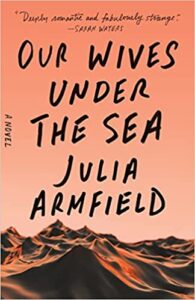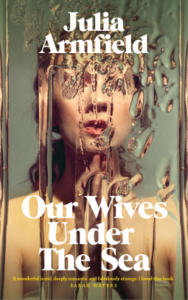I’ve seen this book mainly categorised as horror but after reading it, it feels more like a speculative fiction with elements of horror and sci-fi in it. This book transcends genres: that’s the mark of a phenomenal read!
I went into this story expecting an action-packed, horror-strewn plotline and found something much better and resounding. Leah, a marine biologist, is married to Miri and embarks on a deep-sea mission from which she doesn’t return for six months. It’s a mission that goes horribly wrong and alters her life inextricably. The story is told from alternating points of view of Leah and her wife, Miri.
The first portion of the book portrays the slow and gradual deterioration of their relationship and the silences that hover around them. The writing style is mundanely descriptive and intimate but charged with unspoken emotions. The author spotlights and emphasises their dynamic inner worlds and feelings and their reaction to this traumatic event.
The chapters are interspersed with haunting and heartfelt past memories of the couple that throw into stark relief their dire situation in the present. Miri feels that the only way to move forward is to look back and hold the past as a beacon of light to guide their enigmatic future. This new unprecedented future seems endless, strange and indescribable, and in contrast, the past feels tangible and comforting. So she collects pieces of her past, holds them close to her heart, and soldiers on.
There is a constant tone of nostalgia and a sense of something that is lost and irretrievable. Miri tries her best to be there for her wife through her transformations and it takes a toll on her. For Leah, she carries the horrors that she faced under the sea to her life on the land as well. The sea haunts her days and nights alike. Leah’s experience under the sea isolates her and brings her face-to-face with a truth that lodges itself into her body and continues to take charge of her. It is interesting to witness the struggles of the wives parallelly.
Some of the chapters in the book make brilliant comments on grief and its enduring hold. It shows us how grief can transform us, either for the better or for the worse. Apart from the sea experience, I think the book also comments on how some traumatic events can really shake the foundations of our lives and relationships and permanently set us adrift. Also, I found the naming of the parts in this book very interesting and accurate. It documents how Leah gradually becomes one with the ocean and loses her grip on the land.
The last portion of this book is filled with suspense and it takes on a frenzy sort of urgency. Even though I predicted the ending, it completely crushed me. It reminded me of the movie Shape of the Water. As long as you don’t dwell on the technicalities of the plot, the story is heartbreaking and profound. The book gets sadder as it progresses and then suddenly it plunges you into an abyss of absurdity and terror. I was not ready for it. However, I thoroughly enjoyed reading it! The entire reading experience feels like a poetic submersion!


